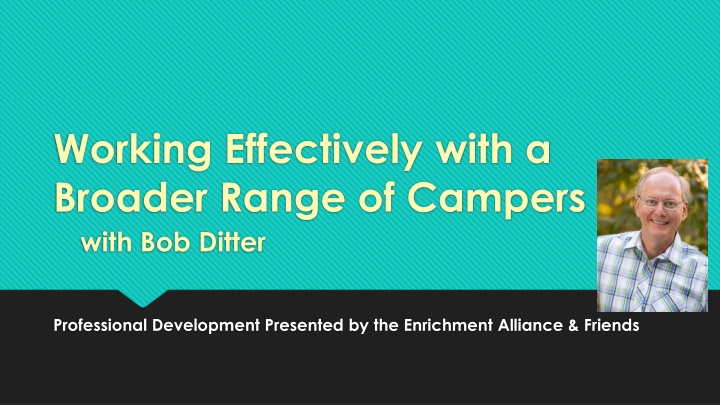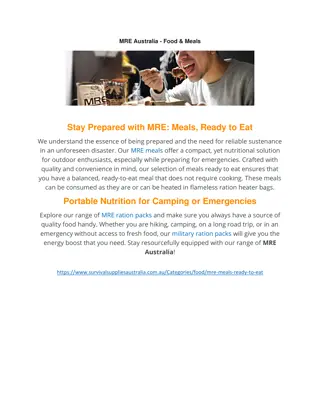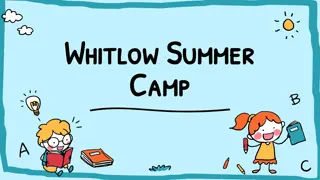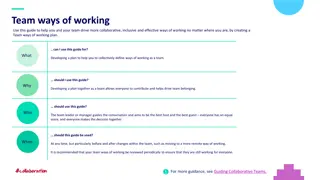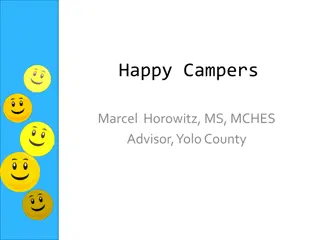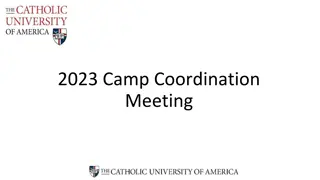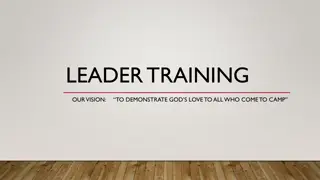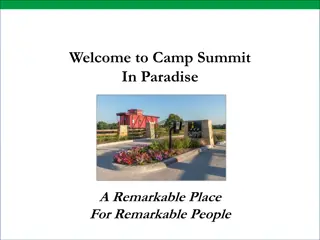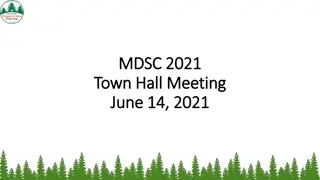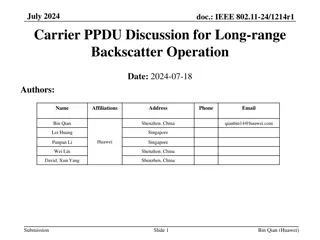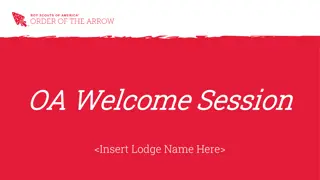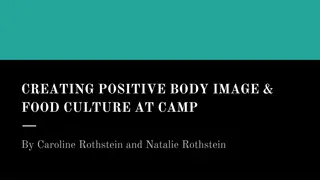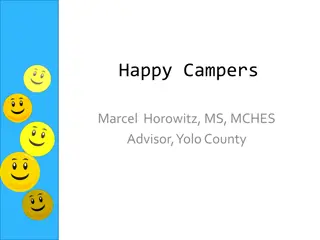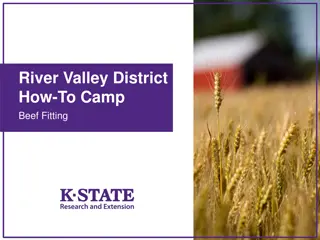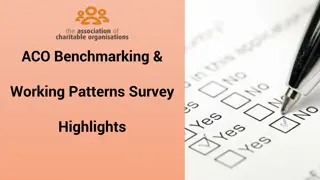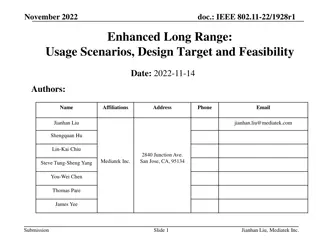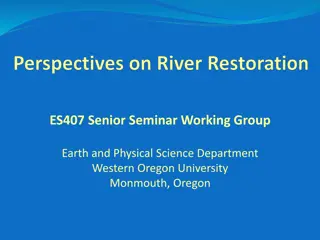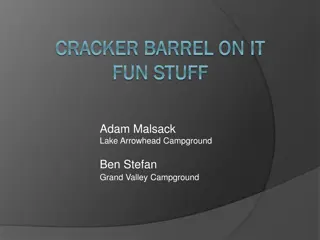Effective Strategies for Working with a Diverse Range of Campers
Enhance your skills in working effectively with a broad range of campers through professional development presented by Bob Ditter and the Enrichment Alliance. Focus on building relationships, understanding psychological needs, and promoting mastery and autonomy for successful camp programs. Learn key approaches and strategies to create a positive impact on campers' experiences.
Download Presentation

Please find below an Image/Link to download the presentation.
The content on the website is provided AS IS for your information and personal use only. It may not be sold, licensed, or shared on other websites without obtaining consent from the author.If you encounter any issues during the download, it is possible that the publisher has removed the file from their server.
You are allowed to download the files provided on this website for personal or commercial use, subject to the condition that they are used lawfully. All files are the property of their respective owners.
The content on the website is provided AS IS for your information and personal use only. It may not be sold, licensed, or shared on other websites without obtaining consent from the author.
E N D
Presentation Transcript
Working Effectively with a Broader Range of Campers with Bob Ditter Professional Development Presented by the Enrichment Alliance & Friends
The Handouts Crossover Count to 20 Balloon Loft The Five Mistakes Counselor Skills Keys to Kids Hot Head Creative Child Management Baby Dolphins ADHD Stimulant Medication Information about Your Child Screening Questions
WORKING EFFECTIVELY WITH CAMPERS An Effective and Successful Approach with Children Parallel process: What we want staff to do with campers we do with them! 1) Build Skills (verbal and non-verbal!) 2) Develop Relationships! Relationships! Relationships! Credibility Trust Impact
The Basic Psychological Needs of Human Beings Children Included! What kids need in order to thrive
Primary Human Psychological Needs Connection Humans like to belong. We are nurtured and fortified through our attachments!
Primary Human Psychological Needs Connection Humans like to belong. We are nurtured and fortified through our attachments! Mastery Humans like to be effective. We like to have an impact on our environment. We are creators.
Primary Human Psychological Needs Connection Humans like to belong. We are nurtured and fortified through our attachments! Mastery Humans like to be effective. We like a sense of self to have an impact on as separate our environment. We separate from are creators. Autonomy Humans crave others to be self-sufficient
Primary Human Psychological Needs Connection Mastery Autonomy I call these three components the Primary Colors of Psychological Needs Camp Programs that offer opportunities for campers to meet these needs are usually highly successful
WORKING EFFECTIVELY WITH CAMPERS You will be more successful teaching skills if you have given your staff a chance to form relationships first! 1) They will absorb more in the context of belonging 2) They will work better as a team if they can connect first 3) Parallel process: you are doing what you will want them to do with the campers! 4) Campers today, with their immersion in social media and gaming, will need help forming relationships at camp
WORKING EFFECTIVELY WITH CAMPERS An Intentional Approach to Training Staff: 1) Less time sitting and listening 2) Activity-based training (It s more memorable!) 3) Do, stop and talk, do some more! 4) Orientation teams: smaller groups that move through orientation together evenly mix returning and new staff
WORKING EFFECTIVELY WITH CAMPERS The Basic Approach: IC2E 1)IMAGE RICH: Use videos and descriptive language 2)Collaborative/Conversation (Get people to talk!) 3)Experiential (learn from doing and debriefing) Grow with staff what we want them to grow with the children )
WORKING EFFECTIVELY WITH CAMPERS Beyond Ice-breakers (what staff tell me): 1) We need more time to get to know one another 2) A experience that goes deeper than ice-breakers 3) Exercises that provide a safe way to reveal more and develop greater trust ( parallel process ) 4) Continuing to develop communication skills for campers and working with one another
WORKING EFFECTIVELY WITH CAMPERS Progression of ice-breakers (this is critical to developing trust): 1) Large group/low risk/low self-revelation 2) Smaller groups/slightly higher risk/more self-revelation 3) Small group sharing and exercises that provide opportunity for deeper sharing, and also develop skill
WORKING EFFECTIVELY WITH CAMPERS Large Group Activities (We re going to create that trust!) 1) Crossover (add particulars that reflect your specific staff) 2) All My Friends and Neighbors 3) Find My Camp Friends 4) Man Overboard (Ships and Sailors)
WORKING EFFECTIVELY WITH CAMPERS Small Group Share: 1) Name 2) Where are you from? 3) Your job, school, current career situation 4) How long have you been at this camp? 5) What was it like the first time you ever came here?
WORKING EFFECTIVELY WITH CAMPERS Small Group Activities: 1) Count to 20
WORKING EFFECTIVELY WITH CAMPERS Small Group Activities: 1) Count to 20 (non-verbal communication) 2) Balloon Loft (Envelope of Safety)
WORKING EFFECTIVELY WITH CAMPERS Counselor Skills The Four Mistakes 1) We talk too much! 2) We get too emotional (and act on it!) 3) We tell kids what we don t want them to do
WORKING EFFECTIVELY WITH CAMPERS Counselor Skills The Four Mistakes 1) We talk too much! 2) We get too emotional (and act on it!) 3) We tell kids what we don t want them to do 4) We pick up the rope! (Get into power struggles)
WORKING EFFECTIVELY WITH CAMPERS Counselor Skills 1) Better Listening (Listening Exercise) 2) Better Observing (Observing Exercise) 3) Drop the Rope! 4) Acknowledge Feelings First! (Connect before you redirect!)
WORKING EFFECTIVELY WITH CAMPERS Counselor Skills 1) Use a child s name 2) Use simple praise (proud versus impressed) 3) Use thoughtful touch (three safe places: upper back, shoulder, arm) 4) Get down on their level
WORKING EFFECTIVELY WITH CAMPERS Counselor Skills 5) Develop a look (in fact, develop two!) 6) Connect before you redirect 7) Take kids aside (shame) 8) Sarcasm
WORKING EFFECTIVELY WITH CAMPERS Counselor Skills 9) Do Countdowns 10) Walk and Talk 11) Create a special job 12) Build momentum lower momentum
WORKING EFFECTIVELY WITH CAMPERS Some Overall Reminders 1) We manage behavior at camp. We don t treat it! 2) If kids are struggling or acting up, look first at the 3 primary colors of psychological need (in this order): Connection (with whom does the camper have a pos relationship?) Mastery (Where does the camper get to feel skillful?) Autonomy (Are we helping the camper develop independence?)
WORKING EFFECTIVELY WITH CAMPERS Some Overall Reminders 3) Are staff members using their basic counseling skills? (Drop the rope/acknowledge feelings/generous with their attention)
The Keys to Campers Missed opportunities to connect with kids Walking between activities Sitting with different kids at meals Rest hour as a huge opportunity Knowing specifics about each kid (pets are huge!) Using Keys as a guide: who am I missing?
WORKING EFFECTIVELY WITH CAMPERS The Point of Struggle 1) Once you are in the struggle, it may be too late to reason with kids 2) Things like a picky eater in the dining hall; bedtime chaos; a child losing his/her temper; when a camper gets triggered are all examples 3) Having a plan and thinking/planning ahead
WORKING EFFECTIVELY WITH CAMPERS Hot Head A Role Play 1) Joining with a child first 2) Charity (Positive attributes or behaviors) 3) Clarity (Stating the challenge simply and in a non-shaming way) 4) I don t think you like it when you lose your temper! 5) I don t want other kids tro get the wrong idea about you!
WORKING EFFECTIVELY WITH CAMPERS De-Escalating Camper Situations 1) What acting out means (as distinct from acting up ) 2) We naturally go into survival mode when we feel attacked! 3) If we respond to provocative behavior with a provocative response, we are escalating the situation 4) We are the adults! (We model self-restraint! Or we don t!)
WORKING EFFECTIVELY WITH CAMPERS De-Escalating Camper Situations 5) Let s remember that acting out is a sign of distress 6) Remain calm. Try to avoid getting triggered yourself! 7) Drop the rope! Avoid the power struggle! 8) Put your judgment away! Shame will escalate and destroy trust! 9) Break it up cool it off then (maybe) talk it out!
